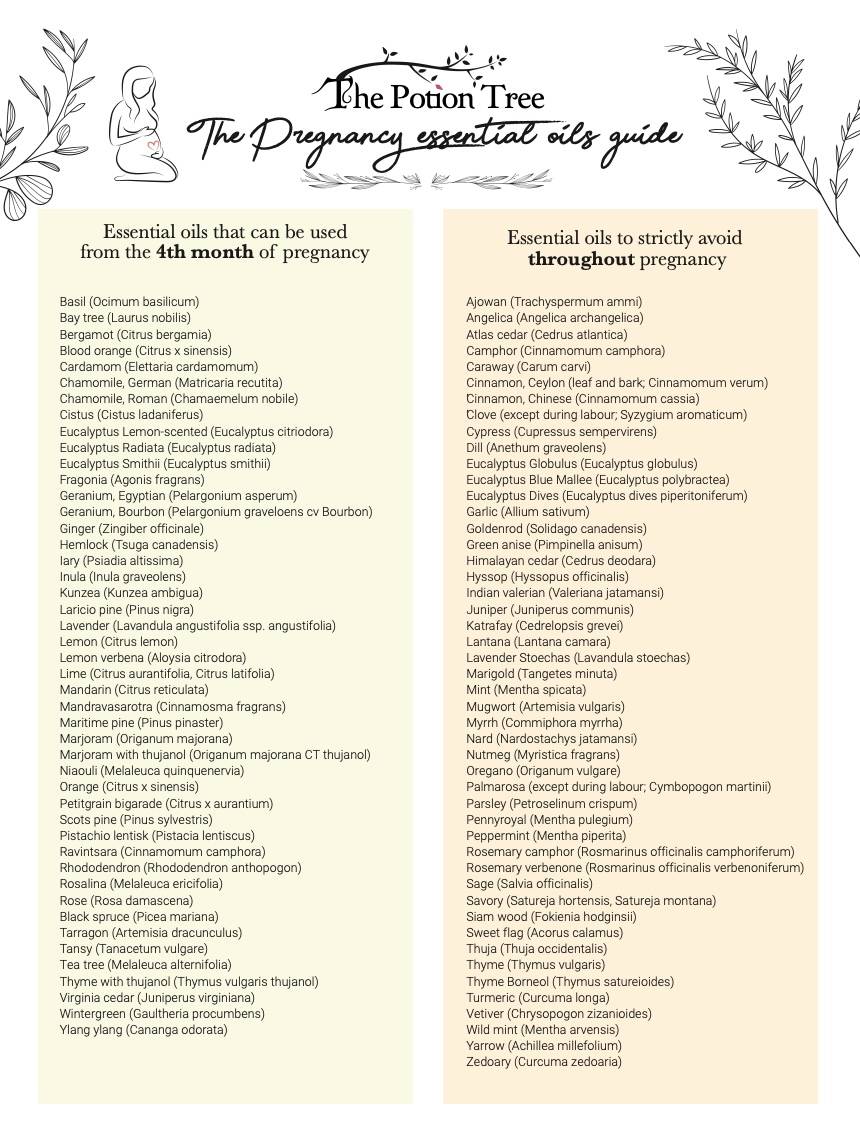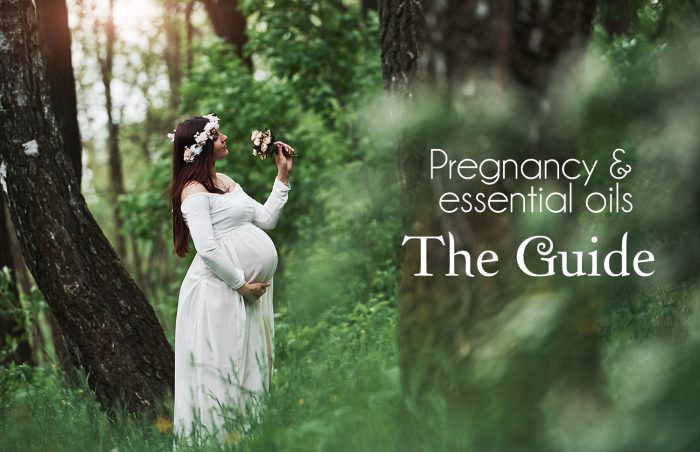Botanics, Ingredients, Mummies
The pregnancy essential oils guide
Pregnancy + essentials oils is a big topic that can leave you confused. During your pregnancy, you may feel vulnerable when it comes to products that contain essential oils—“Is this product safe?” “When can I use it safely?”
In addition, some pregnancy-related ailments do not find a solution via conventional medicine. As a result, some of you turn to natural medicine and especially to aromatherapy. But beware: essential oils, even though they are natural, present risks you should know.
Even if it is intended to be natural and extremely effective against certain maladies, aromatherapy (therapy with essential oils) can prove to be dangerous during certain periods of life, and in particular during pregnancy.
Here are our tips for using these natural essences and choosing The Potion Tree’s products safely.
Essential oils during the first three months of pregnancy = danger !
Even if the risk is purely theoretical and is an excess of precaution, the majority of essential oils are strictly prohibited during the first three months of pregnancy.
The reason is very simple: because they risk passing through the placenta, they represent a danger for the developing fetus and can even cause spontaneous abortions. Same caution if you have decided to breastfeed your baby, because essential oils pass into breast milk.
However, some are authorised for use from the fourth month. These are essential oils that do not contain any toxic molecules likely to cause the slightest harm to mother or child. Do not hesitate to use them with the agreement of your doctor or naturopath.
Effective in relieving nausea, fighting against insomnia, preventing baby blues and even facilitating childbirth, they will be of great help to you, especially since most drugs are prohibited for expectant mothers.
Essential oils to strictly avoid throughout pregnancy
- Ajowan (Trachyspermum ammi)
- Angelica (Angelica archangelica)
- Atlas cedar (Cedrus atlantica)
- Camphor (Cinnamomum camphora)
- Caraway (Carum carvi)
- Ceylon cinnamon (leaf and bark; Cinnamomum verum)
- Chinese cinnamon (Cinnamomum cassia, Cinnamomum aromaticum)
- Clove (except during labour; Syzygium aromaticum)
- Cypress (Cupressus sempervirens)
- Dill (Anethum graveolens)
- Eucalyptus Globulus, Tasmanian blue gum (Eucalyptus globulus)
- Eucalyptus Blue Mallee (Eucalyptus polybractea)
- Eucalyptus Dives (Eucalyptus dives piperitoniferum)
- Garlic (Allium sativum)
- Goldenrod (Solidago canadensis)
- Green anise (Pimpinella anisum)
- Himalayan cedar (Cedrus deodara)
- Hyssop (Hyssopus officinalis)
- Indian valerian (Valeriana jatamansi)
- Juniper (Juniperus communis)
- Katrafay (Cedrelopsis grevei)
- Lantana (Lantana camara)
- Lavender Stoechas (Lavandula stoechas)
- Marigold (Tangetes minuta)
- Mint (Mentha spicata)
- Mugwort (Artemisia vulgaris)
- Myrrh (Commiphora myrrha)
- Nard (Nardostachys jatamansi)
- Nutmeg (Myristica fragrans)
- Oregano (Origanum vulgare)
- Palmarosa (except during labour; Cymbopogon martinii)
- Parsley (Petroselinum crispum)
- Pennyroyal (Mentha pulegium)
- Peppermint (Mentha piperita)
- Rosemary camphor (Rosmarinus officinalis camphoriferum)
- Rosemary verbenone (Rosmarinus officinalis verbenoniferum)
- Sage (Salvia officinalis)
- Savory (Satureja hortensis, Satureja montana)
- Siam wood (Fokienia hodginsii)
- Sweet flag (Acorus calamus)
- Thuja (Thuja occidentalis)
- Thyme (Thymus vulgaris)
- Thyme Borneol (Thymus satureioides)
- Turmeric (Curcuma longa)
- Vetiver (Chrysopogon zizanioides)
- Wild mint (Mentha arvensis)
- Yarrow (Achillea millefolium)
- Zedoary (Curcuma zedoaria)
We have created a lovely table to print (PDF), so you can keep both lists, essential oils to avoid during pregnancy and essential oils allowed after the 4th month, and put them on your fridge (or anywhere else !)

Which essential oils are safe during the pregnancy ?
The use of certain essential oils for external use is possible from the fourth month of pregnancy, but only by remaining cautious and on medical advice.
For a therapeutic use of these essential oils, it is important to respect a few rules:
- The use of essential oils orally is to be avoided (except on medical advice) throughout pregnancy, except lemon essential oil at the recommended doses to fight against nausea
- Topical application remains the best method (however, avoid abdominal massages, which is the zone close to the baby)
- The atmospheric diffusion of certain oils is possible with a suitable diffuser. You can also pour a few drops of essential oils on a handkerchief or a stone that you breathe in from time to time (inhalation)
- Follow the prescribed doses
Essential oils that can be used from the fourth month of pregnancy
- Basil (Ocimum basilicum)
- Bay tree (Laurus nobilis)
- Bergamot (Citrus bergamia)
- Blood orange (Citrus x sinensis)
- Bourbon geranium (Pelargonium graveolens)
- Cardamom (Elettaria cardamomum)
- Chamomile, German (Matricaria recutita)
- Chamomile, Roman (Chamaemelum nobile)
- Cistus (Cistus ladaniferus)
- Eucalyptus Lemon-scented (Eucalyptus citriodora)
- Eucalyptus Radiata (Eucalyptus radiata)
- Eucalyptus Smithii (Eucalyptus smithii)
- Fragonia (Agonis fragrans)
- Geranium, Egyptian (Pelargonium asperum)
- Geranium, Bourbon (Pelargonium graveloens cv Bourbon)
- Ginger (Zingiber officinale)
- Hemlock (Tsuga canadensis)
- Iary (Psiadia altissima)
- Inula (Inula graveolens)
- Kunzea (Kunzea ambigua)
- Laricio pine (Pinus nigra)
- Lavender (Lavandula angustifolia ssp. angustifolia)
- Lemon (Citrus lemon)
- Lemon verbena (Aloysia citrodora)
- Lime (Citrus aurantifolia, Citrus latifolia)
- Mandarin (Citrus reticulata)
- Mandravasarotra (Cinnamosma fragrans)
- Maritime pine (Pinus pinaster)
- Marjoram (Origanum majorana)
- Marjoram with thujanol (Origanum majorana CT thujanol)
- Niaouli (Melaleuca quinquenervia)
- Orange (Citrus x sinensis)
- Petitgrain bigarade (Citrus x aurantium)
- Scots pine (Pinus sylvestris)
- Pistachio lentisk (Pistacia lentiscus)
- Ravintsara (Cinnamomum camphora)
- Rhododendron (Rhododendron anthopogon)
- Rosalina (Melaleuca ericifolia)
- Rose (Rosa damascena)
- Black spruce (Picea mariana)
- Tarragon (Artemisia dracunculus)
- Tansy (Tanacetum vulgare)
- Tea tree (Melaleuca alternifolia)
- Thyme with thujanol (Thymus vulgaris thujanol)
- Virginia cedar (Juniperus virginiana)
- Wintergreen (Gaultheria procumbens)
- Ylang ylang (Cananga odorata)
Essential oils and pregnancy: 7 tips to follow
- Before use, seek advice from a doctor or naturopath, a specialist in essential oils
- Print our PDF table to keep the list of allowed/forbidden essential oils at home
- Never use synthetic oils, which are available in markets, souvenir shops and some cosmetic stores. They have no therapeutic action and can even be dangerous. Use only 100% natural essential oils
- Strictly respect the mode of use as well as the recommended dosage. One drop is one drop and not two, and three times a day is not five times. You won’t heal any faster. On the contrary: you will put your health and that of your child in danger
- Don’t play the apprentice witch by throwing yourself into your own mixtures. The consequences can be very serious, even from a single use
- Only use essential oils for a short period, either on an ad hoc basis (a single dose), or for a maximum of 5 to 10 days
- Never apply essential oils to the abdominal area
IMPORTANT: These indications and methods of use are taken from reference books or websites on aromatherapy and natural cosmetics. They are found there on a regular basis and many of them have been confirmed by observations in the scientific community. This information is given for informational purposes, it does not in any way constitute medical information, nor engage our responsibility. For any use of essential oils for therapeutic purposes, consult a doctor or a naturopath.



